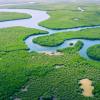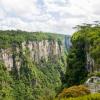
Digitalization has ushered in new markets worldwide and in BRICS countries. However, the concentration of market power and digital resources by only a handful of digital platform ecosystems (DPEs) has also triggered new governance challenges, particularly, for BRICS countries. As part of the dissemination process of the ECOANTITRUST initiative, Elena Rovenskaya delivered a presentation on the adoption of ecological insights and tools to improve understanding of the complex nature of digital platforms, their ecosystems, and their interactions with the wider economy.
On 8 September 2023, the Center for Industrial Development and Environmental Governance (CIDEG) at the Tsinghua University and the BRICS Competition Law and Policy Center invited Elena Rovenskaya, Program Director of Advancing Systems Analysis (ASA), to present the latest findings of the ECOANTITRUST Initiative. In her (virtual) presentation, Rovenskaya presented the three pillars for embracing ecological perspectives and tools to inform understanding of the digital economy.
The first pillar refers to the adoption of an ecological worldview for the domain of the digital economy. Worldviews underpin our perceptions and form our reasonings which play into the decisions we make. Metaphors, analogies, and the lexicon inspired by a particular worldview can have an understated influence on the mental models we form around a subject, and ultimately, play into our choices. Rovenskaya argued that under the currently dominant mechanistic worldview, policymakers see themselves as engineers who seek to maintain the function of markets by tweaking individual components with the notion that value chains remain predictable, linear, and deterministic. She proposed that as value chains have in fact evolved into vast value ecosystems, especially in the digital era, regulators may want to see themselves as gardeners tending to the system, rather than targeting singular components.
The second pillar refers to the transfer of concepts and insights from the ecological domain to the domain of the digital economy. A simplistic example is that of monoculture. Monoculture provided an impressive growth in crop yields in the short run and the homogeneity of farming practices quickly enhanced the scalability of crop-farming. However, homogenous agricultural practices have had lasting negative consequences soil fertility and the severe lack of diversity in the genotype of crops means that entire farms are vulnerable to a single pest that could wipe out the entire ecosystem. Similarly, the concentration of DPEs across several industries has reduced the penetration of diverse innovations and brands into digital markets. The lack of diversity not only harms competition but could threaten the collapse of entire digital markets.
The third pillar refers to adapting specific tools and models from ecology to inform measures in digital competition policy. Here, Rovenskaya presented research conducted in ASA which implements evolutionary dynamics modelling to the practice of data pooling and determines whether DPEs ‘over-pool’ compared to the socially optimal outcome of pooling. Such research can inform improved accountability and regulation for data-pooling practices which are already increasingly prevalent for in critical industries such as healthcare, banking, and financial forensics, but could also pave way for collusion or abuse of power in digital markets.
The academic seminar also hosted discussions from senior academics and expert stakeholders from BRICS countries including Chen Ling, Director for the Center for Industrial Development and Environmental Governance at Tsinghua University, Alexey Ivanov, Director at the BRICS Competition Law and Policy Centre, Yuan Yan, Executive Dean of the Alibaba Research Institute, amongst many others.
To read more about the ECOANTITRUST Initiative, click here.
News

27 November 2023
A credible path for Brazil to reach net zero by 2050 depends on nature-based solutions

27 March 2023
Co-producing fair transformative pathways towards climate and biodiversity goals

05 August 2022


